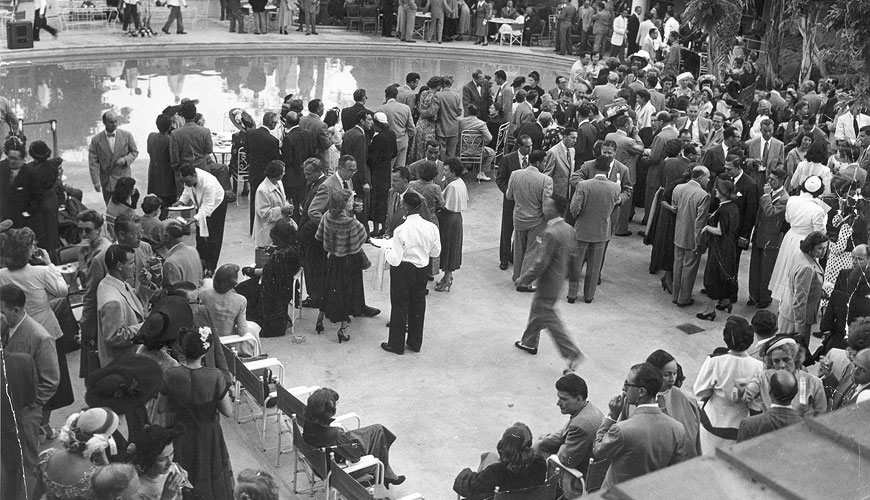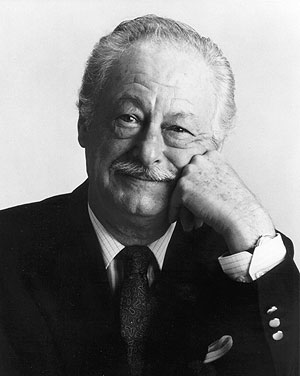The Hottest Ticket in Town – 50 Years of Writers Guild Awards
 Writers and their guests at the first Screen Writers Guild Awards Show at the Bel-Air Hotel, June 23, 1949.
Writers and their guests at the first Screen Writers Guild Awards Show at the Bel-Air Hotel, June 23, 1949.
Covering the Writers Guild’s annual awards for the Times in 1983, Jack Mathews wrote, “You expect good writing at a writers’ awards dinner – and there was plenty of it.”
Thirty years earlier, another reporter lauded our fourth annual Awards by saying, “Nobody puts on a better show than the writers; it’s the hottest ticket in town.”
It remained hot for four decades. Then it began to take itself seriously and in doing so, lost its bellicose charm, its chutzpah and its sense of humor.
The shows also lost the services of writers like Ed Hartmann, Ivan Goff, Ben Roberts, Iz Diamond, Mel Shavelson, Rocky Kalish, Herb Baker, Danny Arnold, Henry Ephron, Mort Lachman, and others whose names modesty prevents me from dropping.
Nobody remembers who first suggested that writers honor themselves – because nobody else in Hollywood did – but whoever started the fire saw it sputter into flame June 23, 1949. The Screen Writers Guild, the first organization of writers to hand out encomia, met at the Bel-Air Hotel not only to drink cocktails but to tell a few.
In a brief ceremony, four awards were given. For the “Best Written” American comedy, drama, Western and musical. Introductions were witty, acceptances were short and writers stood tall.
 Legendary comedy writer-director and longtime Writers Guild Awards show contributor Hal Kanter.
Legendary comedy writer-director and longtime Writers Guild Awards show contributor Hal Kanter.The party instilled such pride in our profession, the writers were emboldened to repeat it the next year. To meet increased requests for seats, they moved to the Beverly Hills Hotel, filled every chair and bathed the room in mirth with such cheeky satire as a scathing parody of Greer Garson’s attenuated Oscar acceptance speech, delivered by Lucille Ball.
Subsequently, we enjoyed an equally insolent tribute to writers by Groucho Marx who said that “behind every successful screenwriter stands a woman. And behind her stands his wife.”
As word spread, the party became the most coveted ticket second only to the Oscars on both coasts (“If General Sarnoff had another son, we’d need another coast,” Groucho said).
Burt Lancaster, who appeared in several Guild shows, credited his own Oscar® win to his appearance with the writers. Many other performers’ careers were reignited by appearing in our shows.
By our fifth one, we added a filet mignon banquet that cost an alarming $10 for members and $12.50 for guests. Even at those prices the demand was so great, tens of applications were denied.
Larger arenas were needed to accommodate the writers, their guests and the press, who enjoyed swapping a few inches of print for a few hours of free booze and belly laughs.
My first writers’ banquet was SGW’s fourth, a formal affair at which I squirmed in a rented tuxedo to listen to a painful speech by a nearly blind Aldous Huxley in L.A.’s Ambassador Hotel. Fortunately, he was followed by the raillery which an impatient audience expected and which future shows continued to deliver.
The following year, I was asked to contribute comedy to the show and continued to do so in various capacities for 30 or so more years. The emotion of those evenings came from winners who were genuinely moved to be honored by their peers and who, often, got bigger laughs than the show’s material.
Leonard Spigelgass, approaching the podium one year, brushed against a waiter serving a fancy dessert and irately complained that he was the only person in the room wearing a whipped cream epaulet.
The year we filled the cavernous Hollywood Palladium to capacity, the show I produced made a profit, despite our agreement with the Theater Authority that our shows had to be non-profit. So we presented gold cufflinks to all participants in the production, thereby happily reporting a loss.
That show hosted one of the largest cast of stars, with special lyrics by I.A.L. Diamond and original songs by Jay Livingston and Ray Evans. The hilarious highlight was a sketch written by Aaron Ruben and Carl Reiner. Vincent Price introduced the “truth” about the authorship of works attributed to Shakespeare: They were collaborations of plodding Francis Bacon, who had talent, and conniving Bill Shakespeare, who had connections.
Carl Reiner played Bill, Fred MacMurray, Francis, and Nita Talbot his nagging wife. The climax came when Bill ad-libbed their unfinished Gimlet (which Francis stubbornly insisted on calling Hamlet) to an Elizabethan impresario (Stanley Adams). Carl’s hysterical blank verse story pitch made that sketch a classic. Carl repeated it for us years later, with George Segal taking over for MacMurray. Nobody could replace Reiner.
An earlier success was my own parody in which Gig Young played nicotine-addicted Ed Murrow, “the filtered man’s thinker.” Going “person to person” with “Britain’s Princess Margaret, the Santa Monica houseguest of George Jessel,” and, in Mississippi, “the Pulitzer Prize playwright, Anger Whipstone.”
Whipstone, played by Jack Warden in a torn T-shirt, was discovered making love on a divan to his sister, an equally outrageous Shirley MacLaine.
Other memorable sketches that have been repeated have included Iz Diamond’s "Quizzically," another classic about two writers battling over one word. And two castaways on a desert island we repeated on at least three more shows with different casts playing the producer thrashing his writer to rewrite the rescue note to be launched in a bottle.
There was an annual newsreel update, pillorying the pompous of the past year, and a rollicking “lecture” by the world’s oldest living exhibitor, written by George Seaton, that explained why writers get so little money. That skit was played by George Jessel in such fashion that nobody could ever come close to recreating it.
Over the years, Renee Taylor and Joe Bologna wrote and played a series of witty, racy scenes. (“I’m not some fly-by-night actress you just slept with. I come from a theatrical family. My mother was an extra and my father was a Teamster.”)
One year, we were vastly entertained by Josh Logan in the Wilshire Ebell theater until he stepped forward to acknowledge an ovation, bowed, fell into the orchestra pit and wound up in the hospital with doctors and lawyers in attendance. The doctors put Logan on his feet and his lawyers put our Guild on its ass.
The following year, as master of ceremonies yet again, I was back in the Wilshire Ebell. As production manager Ed Gustin introduced me, I walked out with two large plastic traffic cones and placed them on the footlights. “I’m not taking any chances tonight,” I said. The audience was already laughing.
The following year, we returned to the relative safety and better food of the Beverly Hilton.
One of the most memorable openings in that room was produced by George Wells during a period when the movie box office was in a slump. Matty Malnick and a full orchestra accompanied the Writers’ Chorus: Three dozen tuxedos occupied by writers marched onstage and sang to the familiar melody, “There’s no business!,” then abruptly marched back to their tables as laughter thundered through the room.
That was followed by the trio of Herbie Baker, Danny Arnold and Al Lewis, who came out for their perennially anticipated opening song and dance. Baker wrote most of those memorable lyrics, parodies of popular songs, like this one from Saturday Night Fever:
“At the writers’ outing/We’re all happy to be shouting/That we’re stayin’ alive, stayin’ alive/Telling each producer/That no matter what you do, sir,/ We’re stayin’ alive… Pitching! Bitching! Stayin’ alii-i-i-ve!”
In earlier years, the Screen Writers joined forces with radio and TV writers to become the WGA; the membership changed and with it came changes in the show. More recently, the show has continued to evolve.
An aging former Guild treasurer, Adam Rodman, seems to regard 1988 as the year when the changes became palpable. After the strike that year, he wrote, “David Letterman was more likely to be the source of style than Milton Berle. There were still some familiar elements, and Hal Kanter remained the MC but it was the start of a new era.”
In 1991, he went on, “The most noticeable difference (aside from finishing at 10:30 instead of around midnight) was our first female emcee, the excellent Elayne Boosler, and the show’s humor was no longer self-deprecating.
“There were no jokes with writers as victims. As the industry has come to value writers more highly, to respect them creatively and pay them accordingly, so too have the writers come to value themselves,” he concluded.
One wonders if today’s writers recognize that it may have been the WGA’s ribald and rebellious years of self-deprecating fun and expressions of outrage toward the injustices in our industry that was a force in changing that industry’s attitude toward writers.
Perhaps after 50 years, it’s time for us to return from complacency and politically correct timidity to the impudent passion and kick-ass sensibilities of historic Guild Awards shows that kept the industry laughing with us, not at us.
Let’s exercise our sense of humor again. Irreverence, after all, is the birthplace of originality, the quality that distinguishes us as writers.
(From the 50th Annual Writers Guild Awards Program – February 21, 1998)
